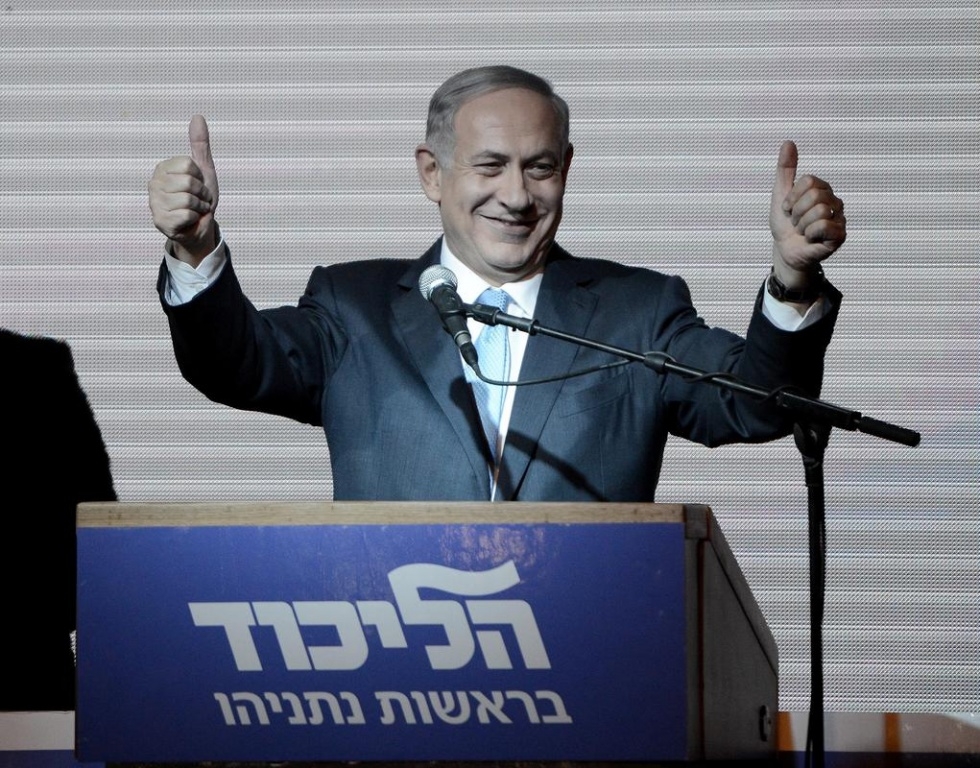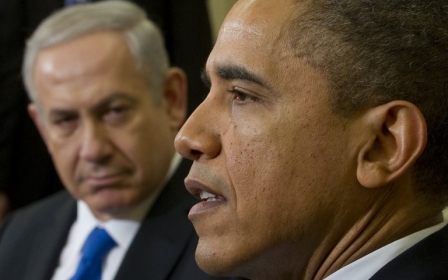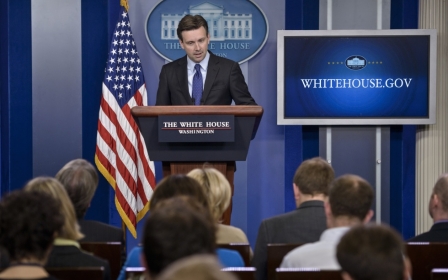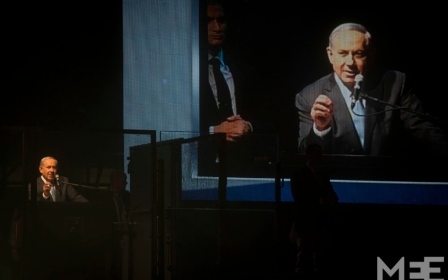Netanyahu’s obstinacy will push the EU into embracing Palestine

For a few brief happy days, the US President, European leaders and the whole Middle East peace process circus could dream of an alternate reality – an Israeli coalition that at least could talk of wanting peace.
The Israeli electorate delivered a wake-up call. Netanyahu specialises in winning elections not winning friends. Any doubts as to the Siberian state of Obama-Netanyahu relations were reinforced when the White House political director, David Simas, pointedly congratulated Israel and Israelis for the elections and not Netanyahu for winning. The cold war between the White House and the re-elected Israeli premier is replicated in many European capitals and not just Sweden.
Added to the general aversion of dealing with such a stubborn character as Netanyahu is that he has just run one of the most racist campaigns in Israeli history. In the past, Netanyahu left these unsavoury roles to his fellow right-wingers Avigdor Lieberman and Naftali Bennett but never chastised them for their comments. This time, Netanyahu himself got in on the act. His last-minute Facebook post warned, “Hurry friends, the Arabs are going out in droves to vote, bussed in by the left.” Even at his victory speech, with electioneering supposedly over, Netanyahu invited Amir Benyaoun, a singer known for a song where he describes Arabs as scum and murderers. The White House lost little time in expressing its concerned about “the use of divisive rhetoric in Israel that sought to marginalise Arab Israeli citizens”.
Worryingly, the racist scare tactics about Arabs worked, but there will be no rush amongst elected foreign leaders to stand shoulder-to-shoulder with "Bibi" after that. Talk of shared values may be in decline. Many of Israel’s historic supporters in Europe may speak out or refuse to defend Netanyahu.
How do EU leaders react?
So far, the reaction has been pretty much standard protocol. EU foreign affairs chief Federica Mogherini called Netanyahu to congratulate him but emphasised the need to have a “comprehensive peace agreement based on a two-state solution”.
This will not last.
Netanyahu is on course to further sabotage, crush and undermine long standing key security and national interests of the European Union.
Firstly, there is no peace process with the Palestinians, and Netanyahu does not even seem to want one. He opposes a Palestinian state, and opposes any form of two-state solution. He will continue to build settlements. He could not have been clearer.
It was never difficult to see through Netanyahu’s almost transparent fig leaf of his 2009 statement in support of a two-state solution, but he now stands naked on the issue.
Perhaps what is most amazing is that any politician or diplomat every truly believed Netanyahu’s original proclamation of support in the first place. It ran counter to everything Netanyahu had done – let us not forget he opposed the Oslo Accords, he opposed the disengagement from Gaza and has pushed ahead settlement projects all over the West Bank.
This is why there is no post-election “clarification” or “explanation” that will sound in any way convincing even to the most diehard of keep-a-process-going-at-all-costs European politicians. He meant what he said on statehood and nearly everyone in Israel believed him so why should the Palestinians let alone anyone else see things differently.
Now that we know where he stands, and given that the nature of the future coalition will be more right-wing than his two previous ones, how will Europe react? What are the options?
To ignore the anti-peace platform is not realistic. It would just re-expose the hypocrisy. The double standards are staggeringly clear. If any Palestinian leader denounces the two-state solution and says that there should not be a state of Israel, certainly the United States would initiate sanctions and the EU might well certainly follow. An Israeli leader is judged by different standards, at least until now.
The EU could opt out, cut back funding and abandon all efforts to promote a solution. This might appeal to an inward-looking EU more obsessed with the economy, Greece and Russia than Israel.
This would be leaving the Palestinians to the fate of perpetual occupation, at the mercy of a an Israeli coalition that will include one minister who advocates head-chopping with an axe and another who boasted 'I've killed lots of Arabs in my life and there's no problem with that.”
But it would mean saying "adios" to the two-state solution that has had been the lynchpin of the EU’s Middle East strategy for years. Billions of euros, pounds, marks and francs have been devoted to keeping this option alive. Taxpayers can ask legitimate questions about whether to continue down this well travelled path if it just leads over the cliff.
The EU could choose to try to preserve any vestigial chances of a two-state solution by persuading Netanyahu not to cross red lines above in all in expanding key strategic settlements such as E1 and Givat Hamatos. Either one of these existing Israeli settlement plans would cut Jerusalem off from the rest of the West Bank.
The European aim would be to allow the “Middle East peace process” to remain in the deep freeze until Netanyahu eventually loses an election. But waiting for Netanyahu to lose an election also is flawed. These elections have shown how strong the in-built majority is for the right wing. His replacement is unlikely to be a lefty, peacenik human rights activist.
Persuasion will not work unless there are massive incentives or massive pressure. Agreeing on either will test the limits of European unity to the extreme. A possibility maybe a ban on settlement products in the EU or a rejection of Israel in EU programmes.
More likely is that a variety of EU states, not just parliaments, might recognise the state of Palestine, even opening embassies across Europe. There may be increased backing for Palestinian diplomatic efforts in the international arena, at the UN Security Council and even at the International Criminal Court. This would appeal to those states averse to be seen as punishing or sanctioning Israel.
Secondly, an Iran deal also matters to the EU, but Netanyahu not only rejects a deal but he is actively prepared to undermine it. His speech to Congress was just the most high-profile public part of that strategy. The logical outcome of the Netanyahu approach is more sanctions leading to conflict. Many presume that this is exactly what Netanyahu wants and sooner rather than later. There is no EU state itching to sign up for a war with Iran. Not one.
This will be a test of wills. If the framework deal is agreed at the end of March, the US administration and the rest of the P5+1 will line up against Israel, the US Congress and Arab states such as Saudi Arabia and the UAE.
The accusation of the Israeli left was that Netanyahu would make Israel a pariah state, not least in Europe. Ironically, this may not have been the case until his last-minute desperate racist ultranationalist pitch. It is quite possible that the EU-Israel rift that has been opening for the last few years will soon become a huge chasm.
- Chris Doyle is the director of Council for Arab-British Understanding. As the lead spokesperson for CAABU and as an expert on the region, he is a frequent commentator on TV and radio and gives numerous talks around the country on issues such as the Arab Spring, Libya, Syria, Palestine, Iraq, Islamophobia and the Arabs in Britain.
The views expressed in this article belong to the author and do not necessarily reflect the editorial policy of Middle East Eye.
Photo credit: Netanyahu revels in his victory in recent elections in Israel (AA)
Middle East Eye propose une couverture et une analyse indépendantes et incomparables du Moyen-Orient, de l’Afrique du Nord et d’autres régions du monde. Pour en savoir plus sur la reprise de ce contenu et les frais qui s’appliquent, veuillez remplir ce formulaire [en anglais]. Pour en savoir plus sur MEE, cliquez ici [en anglais].





